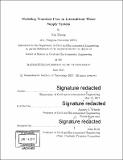Modeling transient flow in intermittent water supply System
Author(s)
Zhang, Xin, Ph. D. Massachusetts Institute of Technology.
DownloadFull printable version (8.977Mb)
Other Contributors
Massachusetts Institute of Technology. Department of Civil and Environmental Engineering.
Advisor
Andrew J. Whittle.
Terms of use
Metadata
Show full item recordAbstract
Water distribution systems in cities throughout South Asia (and many other countries) only supply water on an intermittent basis (currently averaging less than 5hrs/day in most Indian cities). Intermittent Water Supply (IWS) creates inequities in water availability and carries public health risks associated with the ingress of contaminants from the surrounding ground through flaws in the aged piping systems. It is a major challenge to upgrade from intermittent to continuous water supply (CWS) as this involves an increase in the operating water pressures which promotes higher rates of leakage. There are currently no reliable computational models for characterizing the transient hydraulic behavior of IWS systems (including pipe filling and draining events) and hence, it is difficult to understand and control IWS systems. In a recent PhD thesis, Lieb (2015) developed an open-source code to solve the dynamics of IWS pipe networks through finite volume solution of the governing 1-D Saint Venant equations using the Preismann slot approximation. The current thesis extends and refines the algorithms proposed by Lieb to enable more robust simulations for pipe networks. Specific modification include algorithms for dry pipes and three-pipe junctions. The thesis proposes a new algorithm for representing the conservation of fluid mass, momentum and energy at a three-pipe junction which is validated by comparing computed loss coefficients with measured data reported in the literature. The research also validates predictions of mixed flow conditions (open-channel and pressured pipe flow conditions) with results from laboratory model tests. The proposed formulation has been applied to simulate a skeletonized pipe network (at a test site in Delhi), where simulations are compared with water pressures during intermittent water supply periods. The proposed analysis represents a first step towards comprehensive modeling of IWS that can be used to improve understanding and control of these systems and to manage the upgrading process for CWS operations.
Description
Thesis: S.M., Massachusetts Institute of Technology, Department of Civil and Environmental Engineering, 2017. Cataloged from PDF version of thesis. Includes bibliographical references (pages 91-96).
Date issued
2017Department
Massachusetts Institute of Technology. Department of Civil and Environmental EngineeringPublisher
Massachusetts Institute of Technology
Keywords
Civil and Environmental Engineering.